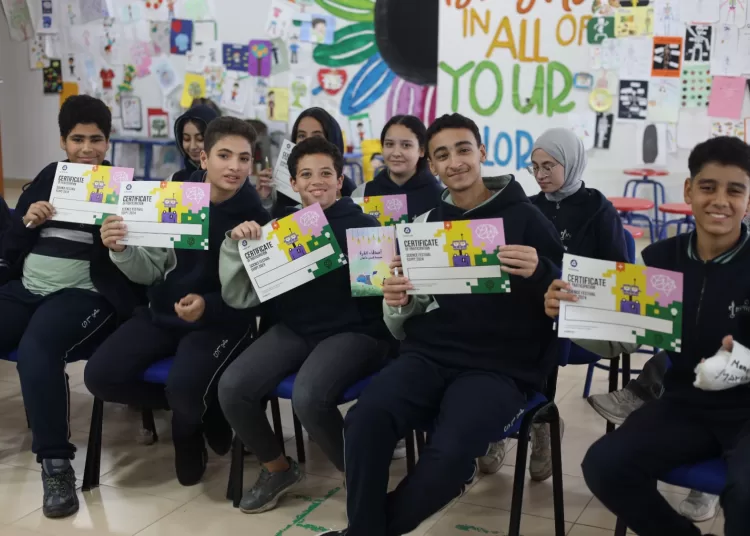Rosatom, the global technology leader, organised its second Science Festival Week in Egypt.
Held from December 8 to 12, 2024, the festival took place in Cairo, Alamein, and Alexandria cities. Festival aimed to raise awareness of nuclear technology, popularise science among young people and display the transformative potential of nuclear science and technology.
The festival, which captivated the participation of more than 2800 school and university students from diverse educational institutions, featured events held at the Cairo and Alamein campuses of the Arab Academy for Science, Technology and Maritime Transport, as well as Ain Shams University.
Furthermore, students from Egypt Language School, Inspire School in Giza, and the European Schools of Alexandria engaged in thoughtfully curated activities designed to make science both accessible and inspiring. Experts from Egypt’s Nuclear Power Plants Authority (NPPA) and Egyptian Atomic Energy Authority (EAEA) took part in the events sharing insights into the history of nuclear energy in Egypt and the development of the El Dabaa Nuclear Power Plant, its timeline, and its socio-economic significance.
These sessions provided a comprehensive perspective on Egypt’s nuclear power initiatives and their pivotal role in advancing the national economy.
“At Rosatom, we see the Science Festival as more than just an event; it is a platform to inspire and empower the innovators of tomorrow,” said Murad Aslanov, Director of Rosatom’s Office in Egypt. “Each time we engage with young minds, we uncover their eagerness to embrace the world of innovative science.
These students, brimming with curiosity and determination, will not only witness the El Dabaa Nuclear Power Plant come to life but will also shape the future of science and technology in Egypt. Through engaging events such as the Science Festival, we have brought their aspirations closer to reality, providing them with the knowledge and tools that will put them on the right track to drive scientific progress in Egypt and excel on the global level”, added Aslanov.
The week-long event offered tailored activities for all ages.
University sessions explored global nuclear energy trends, low-carbon technologies, and scientific breakthroughs, while career seminars introduced opportunities for advanced studies in Russia and careers in clean nuclear energy.
As part of the events, Rosatom organized screenings of Oliver Stone’s “Nuclear Now” which explores nuclear energy path, explains its benefits in addressing global environmental challenges and demystifies common misconception about modern nuclear industry.
For younger audiences, school activities featured hands-on experiments and interactive lectures showing science accessibility and sparking interest of the young participants in STEM fields.
“The Science Festival provides a unique platform to bridge the gap between theoretical knowledge and practical application, inspiring students to envision the transformative potential of nuclear physics and engineering.
Engaging with university and school students here in Egypt has been incredibly rewarding; their curiosity and enthusiasm reaffirm the critical role of education in shaping the future of sustainable energy and technological innovation”, said Dr. Alexander Nakhabov Deputy head of Nuclear Physics and Engineering Department – Obninsk Institute for Nuclear Power Engineering
From her side, Prof. Valeriia V. Budko, Head of the International Admission Center at the National Research Nuclear University MEPhI, noted the strong interest and engagement from students during her sessions, emphasizing the festival’s role in guiding young minds toward educational and career opportunities in nuclear science.
Budko expressed confidence that these talented individuals have the potential to become key contributors to scientific and technological advancements in Egypt.
Students and volunteers on the other hand, shared their excitement about the festival: “The sessions inspired me to think about nuclear science not just as a field of study but as a way to solve global challenges”, said Abdel Rahman Mohamed Saad, student at Arab Academy for Science & Technology Smart Village Campus.
From her side, Marwa Ibrahim, Assist. Prof. at Nile University noted, “Seeing the enthusiasm in the students’ eyes makes all the effort worthwhile. It’s incredible to be part of something that has the power to shape their futures.”
Reference:
The Science Festival Week is part of Rosatom’s global initiative to promote education and innovation, successfully implemented in nations developing nuclear industries, including India, Bangladesh, Uzbekistan, and Belarus.
El Dabaa NPP is the first nuclear power plant in Egypt. It is being built in the city of El Dabaa in the Matrouh Governorate on the Mediterranean coast, about 300 kilometers northwest of Cairo.
The plant will consist of four power units with a capacity of 1,200 megawatts each, equipped with Russian-design VVER-1200 pressurized water reactors.
This is an evolutionary design of generation III+, which fully meets international safety requirements.
Russia is actively developing cooperation with all interested countries. The implementation of major international projects continues. Rosatom and its divisions are actively involved in this work.






Discussion about this post